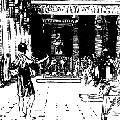04. Joseph in Egypt
"Governor over all the land of Egypt." —GEN. xlv. 26.
There had been changes in Egypt since the days of Abraham. The long line of native kings had come to an end, and some new rulers or Pharaohs had arisen, known as "Shepherd kings." It was during the reign of one of these shepherd kings that Joseph was sold into Egypt. There had been a great deal of fighting, too, in the country, and now the tract of land belonging to the Egyptians was much larger than of old, and a wonderful new city called Thebes had been built on the Nile, some distance above Memphis.
Now these Pharaohs ruling over Egypt were held to be very great men, and they were treated with great pomp and dignity. The old tablets and monuments tell us, in their quaint picture stories, how splendid were the courts of these kings, and how all men bowed down to them. They tell us stories of the king's household: of his many servants, the royal barbers and perfumers, shoemakers, tailors; of those who presided over the royal linen, of the laundresses who washed it in the river Nile. They tell us of the troops of musicians, singers, dancers, cooks, butlers, bakers, and magicians.
The Egyptians of old drew pictures showing how the Pharaohs received taxes from the people, not in money, for they did not use money in those days, but in fruit, oxen, or grain. And there were buildings connected with the royal palace at Memphis: there was the storehouse for grain, the storehouse for fruit, and the white storehouse, where stuffs and jewels are kept.
So the Pharaohs were very rich and powerful, and they did as they pleased with their kingdoms. Joseph would have heard all about the ruler of Egypt from his master, but being a slave himself he would have had no chance of seeing him.
Now, since he had been in Egypt, Joseph had shown himself very clever at explaining dreams, and this fact came to the ears of the great Pharaoh, who was puzzling sorely over a strange dream he had lately had.
So he sent for the young Hebrew servant, and Joseph stood before Pharaoh.
"I have dreamed a dream," said the great king, "and there is none that can interpret it: and I have heard say of thee, that thou canst understand a dream to interpret it." It must have been a great moment for the young stranger from Canaan as he listened to Pharaoh's dream, but his fame had not gone abroad in vain. He understood the dream, and he said to Pharaoh:
"Behold, there come seven years of great plenty throughout all the land of Egypt: and there shall arise after them seven years of famine; and all the plenty shall be forgotten in the land of Egypt; and the famine shall consume the land; and the plenty shall not be known in the land by reason of that famine following; for it shall be very grievous." Then, unbidden, Joseph went on to tell the king what had better be done to save the land.
"Let Pharaoh look out a man discreet and wise, and set him over the land of Egypt. And let him appoint officers over the land, and take up the fifth part of the land of Egypt in the seven plenteous years. And let them gather all the food of those good years that come, and lay up corn under the hand of Pharaoh, and let them keep food in the cities. That the land perish not through the famine." The words of the young stranger showed great foresight, at which the king must have marvelled. Surely such wisdom was no common thing.
"Can we find such a one as this is?" he said to his servants round him. Then turning to Joseph he said:
"Thou shalt be over my house, and according unto thy word shall all my people be ruled: only in the throne will I be greater than thou. See, I have set thee over all the land of Egypt." And so, while his father mourned for him as dead in the land of Canaan, Joseph was governor over all the land of Egypt—second only to the king. Instead of the little coat of many colours, he now wore the white robe of state, the king's own ring was on his finger, the king's own gold chain was about his neck. He rode in the royal chariot, and before him the Egyptians ran shouting, as they do in the streets of Cairo to-day when any great person is driving through the crowded masses of men and beasts.
It was thirteen years since he had left his home, a shepherd boy in Canaan. Now he travelled all over the country, seeing that the grain was stored up in every large city of Egypt. And so the seven years of plenty passed by and the granaries of Egypt were full to overflowing.
The story of the Nile overflow, by which years of plenty and famine were decided, is a world-famed story, dating from the very dawn of history to the present day.
Let it be told yet once again.

